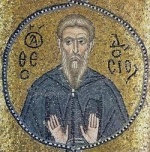St Theodosius and Servant of God Elizabeth Prout

Abbot. Born at Cappadocia in 423, Theodosius went on pilgrimage to Jerusalem as a young man, with dreams of becoming a hermit. For a time he lived in a monastery. Then he settled in the desert alone. But his teacher, an elderly monk called Longinus, noticed that he had other gifts and advised him to lead a more public life.
In 479, near Bethlehem, Theodosius established what was to become the largest and most well organised of the Judaean monasteries, with several hundred monks. He built a church for each of the language groups and three hospitals. One cared for the elderly, one was for the mentally ill and one was for people physically sick. In this large community, Greeks, Armenians. Persians and Arabs all worked and prayed happily together. No one was ever turned away without a meal and good hospitality, no matter how little the monks had to eat for themselves.
The Patriarch of Jerusalem appointed St Sabas head of all the hermits, while St Theodosius was responsible for those living in community (hence the title Cenobiarch).
Theodosius was a staunch opponent of the Monophysism which lead to him being removed from office by the Emperor Anastasius. He was about 105 years old when he died. His monastery has been refounded, although it is now surrounded by houses, near Bethlehem. It is on the route of pilgrims to the Holy Land.
Read about the monastery here: www.beitsahourchurch.ps/en/church-beitsahour-en/monasteries-en/ibnobeid-en
and Servant of God Elizabeth Prout
Founder, Sisters of the Cross and Passion (1820-1864). Elizabeth Prout was born in Shropshire, England. Though raised as an Anglican, she converted to Catholicism in her mid-twenties through the influence of Fr. Dominic Barberi, a charismatic Italian Passionist priest. (Among his other famous converts was Saint John Henry Newman.) Searching for some way to support herself and to be of service, she moved to Manchester in 1849 and found work teaching in a school in the slums. This was the heart of the Industrial Revolution-the very city of mills and factories that had inspired Friedrich Engels to help draft The Communist Manifesto.
Elizabeth was appalled by the terrible poverty and squalor of the urban poor, especially the prospects for children. With other companions and the support of a priest (who described her, at just five feet tall, as "a little woman brimful of energy and will") she established the Institute of the Holy Family. She became Mother Mary Joseph of Jesus.
While maintaining a life of communal prayer, the sisters would go out and work among the poor-teaching, sewing, even working in the mills-to support themselves. They endured terrible poverty and aroused suspicion and opposition from many local priests. But eventually the tide turned. Prout died on January 11, 1864. Her institute survived and was eventually affiliated with the Passionists as Sisters of the Cross and Passion. Her cause for canonization is in process.
Servant of God Elizabeth Prout: "Lord, no matter how hard my life is, I am happy because I know You love me. I want to share that happiness with my brothers and sisters in Manchester. And to reach them I must share their lives, work with them and teach them."
BBC Songs of Praise reported on the progress in the Cause for Sainthood of Venerable Elizabeth Prout, the Shrewsbury-born foundress of the Passionist Sisters, from her shrine in St Helens, Lancashire, on March 14th 2021.
See the programme here: https://youtu.be/ih_pZCbyty4?feature=shared












